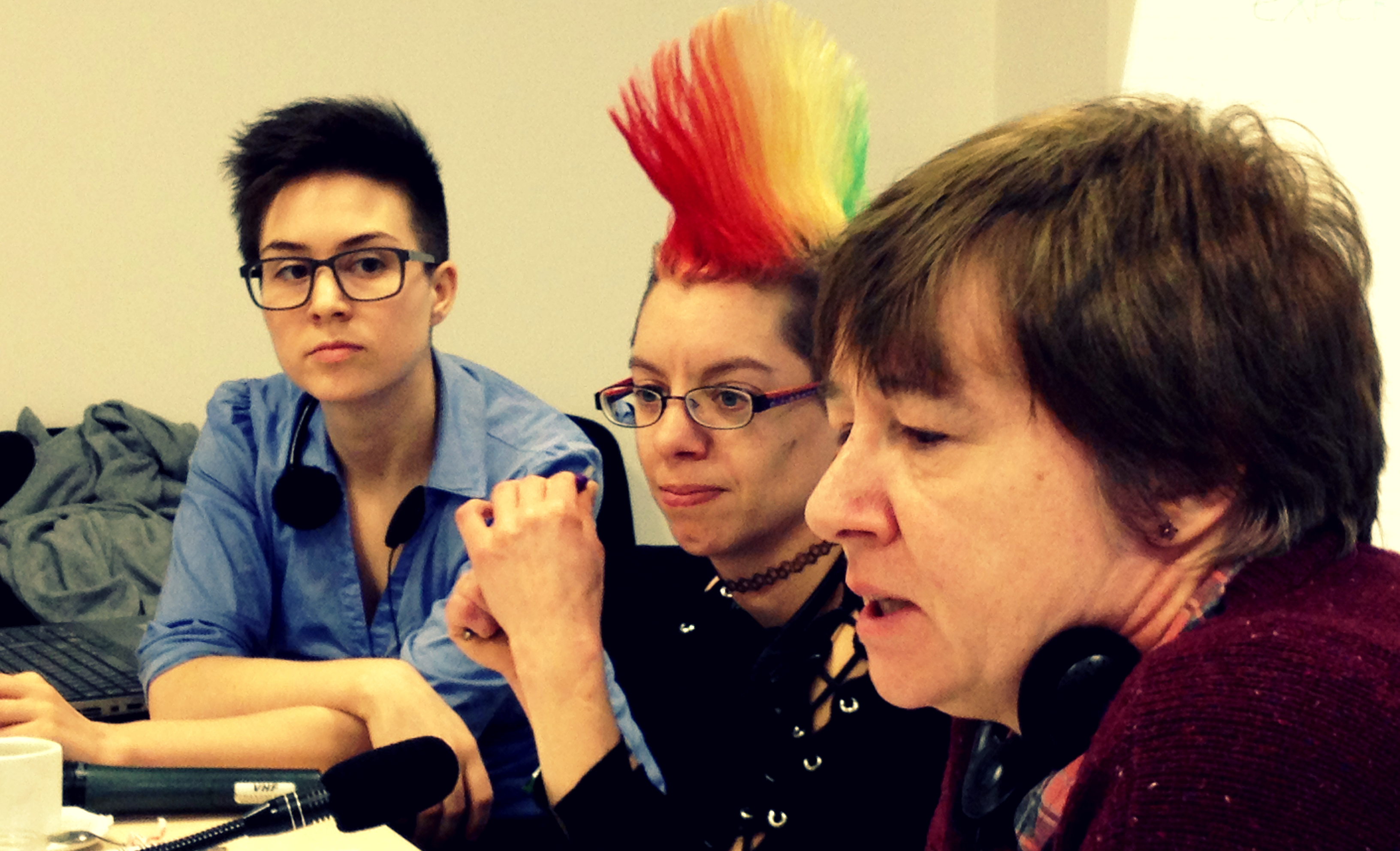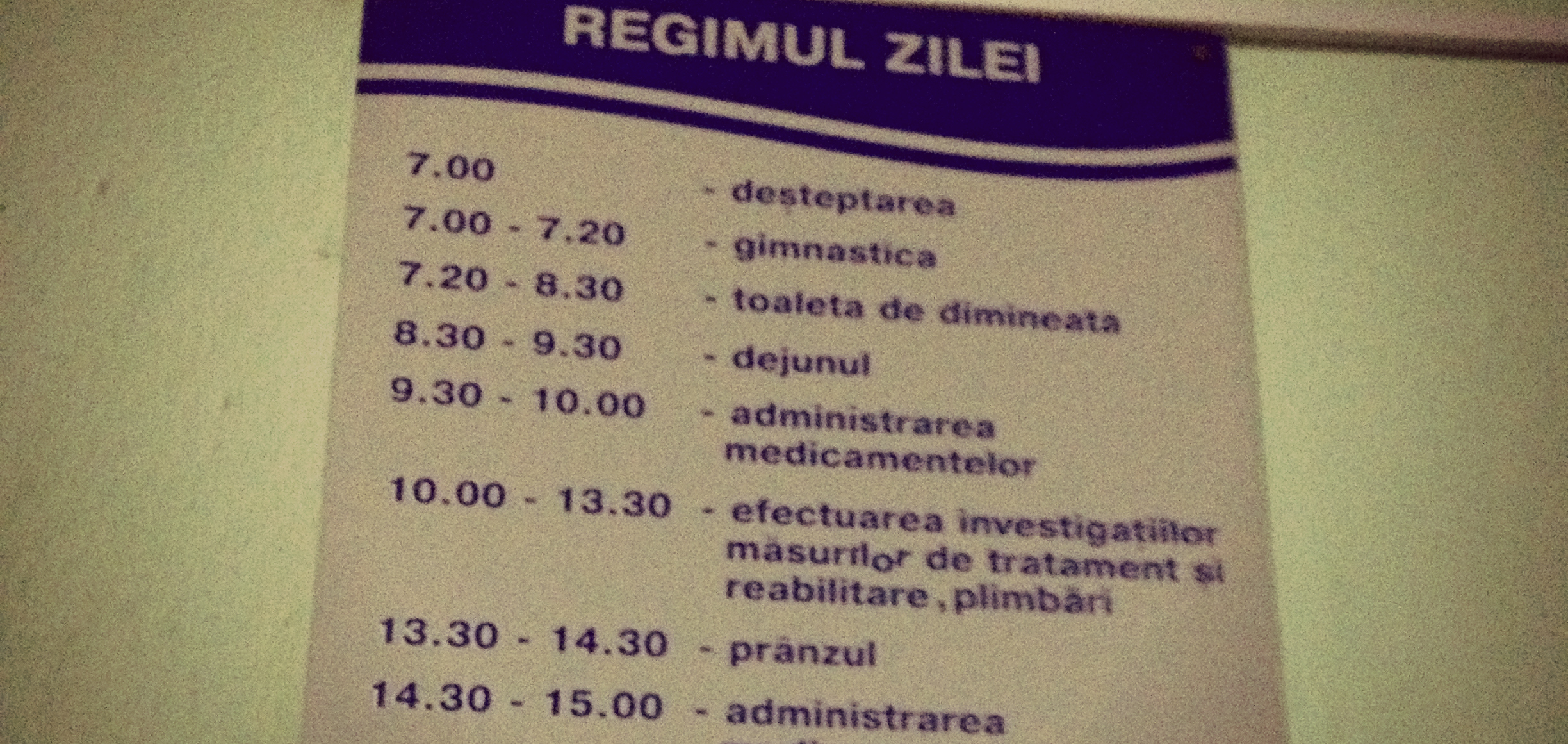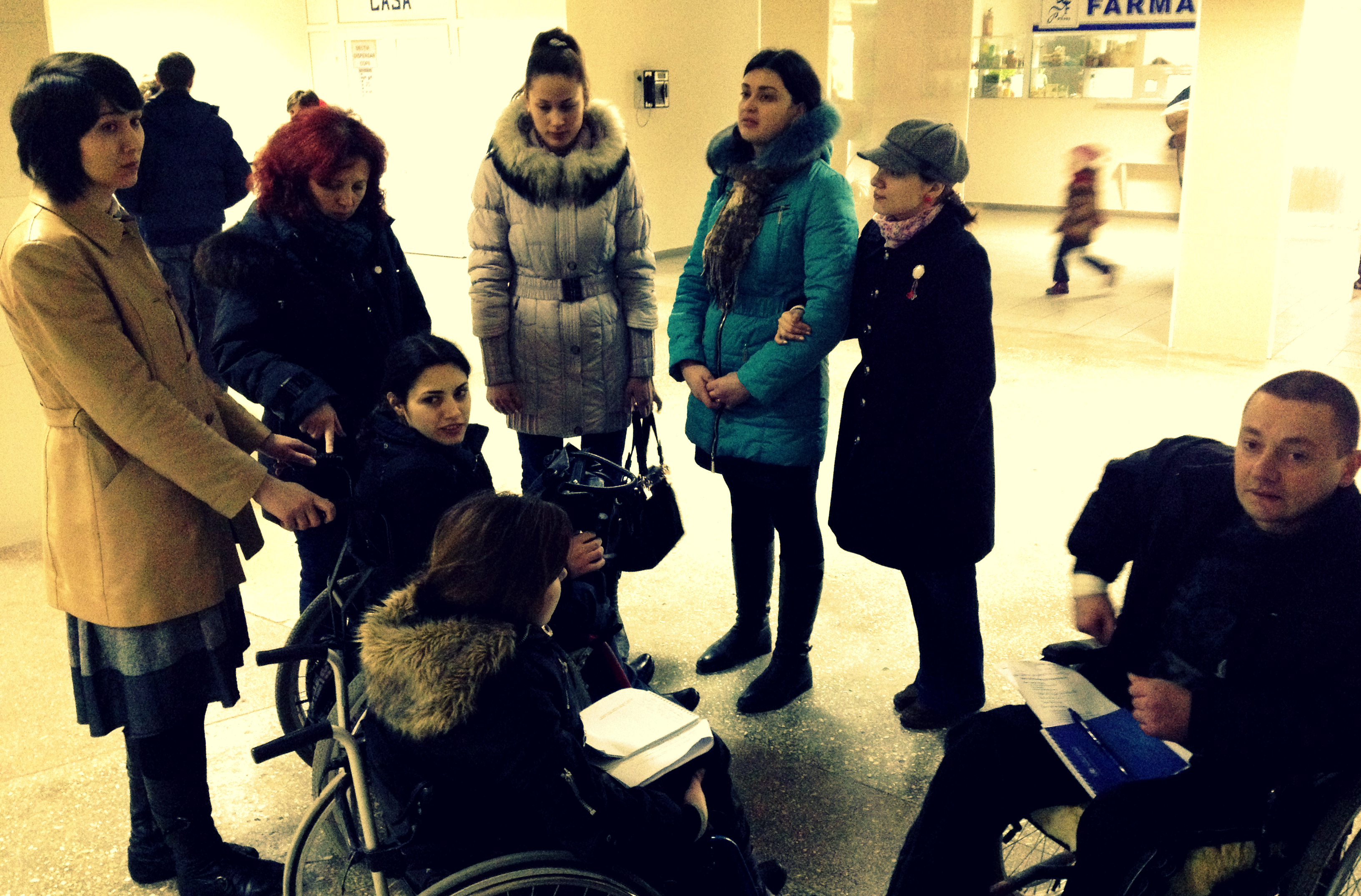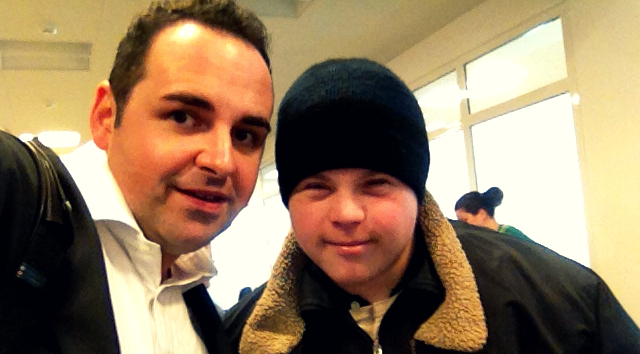In the Moldovan mental health system, voluntary means involuntary, consent means coercion, yes means no, and a safeguard means a rubber stamp. Reducing law into formalistic fiction creates an environment where healthcare staff mistreat patients to such an extent that some instances amount to torture. The new Moldovan government needs to abandon the focus on hospitals and instead ensure that law underpins autonomy, that budgets are oriented towards community-based supports, and that people with disabilities participate in monitoring human rights.
 Dorottya Karsay, Jolijn Santegoeds and Kay Sheldon speak to participants at the training event
Dorottya Karsay, Jolijn Santegoeds and Kay Sheldon speak to participants at the training event
Wifi and wine
I recently spent a week in Chisinau, the capital of Moldova, once the richest Soviet republic and now one of the five lower income countries in the Council of Europe region (the others being Armenia, Georgia, Kosovo and Ukraine). Moldova is snuggled between Romania to the west and Ukraine to the east, with the population speaking Romanian and/or Russian, or other assorted minority languages. Moldova tops the world in alcohol consumption and has one of the highest prevalence of multidrug-resistant tuberculosis. That said, the parks in the capital Chisinau have free WIFI, the wine is fabulous, and the people upbeat.
With my colleague Dorottya Karsay and consultants Jolijn Santegoeds and Kay Sheldon, I spent a few days in Moldova training a group of nascent human rights activists with disabilities. The training focused on how to monitor psychiatric hospitals and social care institutions. We conducted the training with funding from the UK Embassy in Chisinau through the Strategic Programme Fund of the UK Government, and (inhale now) the “UN Partnership to Promote the Rights of Persons with Disabilities Multi-Donor Trust Fund”, administered by the Office of the UN Resident Coordinator in Moldova. More on this project in another blog post soon.
 One of the buildings of Chisinau Psychiatric Hospital
One of the buildings of Chisinau Psychiatric Hospital
 The daily regime does not offer much choice
The daily regime does not offer much choice
A linguistic madhouse
As part of the training, we took the participants to the Chisinau Psychiatric Hospital. This is a mega institution which I last visited in December 2011. It is situated on the outskirts of the city and has 960 beds. On arrival, we split up into two groups, and my group visited the male wards: an admission ward and a forensic ward.
In the admission ward I met Alex, a 21-year old slim young man with eastern European chiselled cheeks. Through an interpreter, I explained I did not work for the hospital and was there to ask him some questions if that was ok. He agreed. Alex told me he had had no previous contact with the mental health system, and had been in the hospital 200 years, which I understood to mean that he felt he had been there a long time. He later told me the date on which he had been admitted by his mother: three weeks beforehand. He told me that on admission the doctors had taken him into a bedroom. He showed me the room. In it were 12 narrow iron-frame beds tightly lined up together with hardly any floor space remaining. Each had a thin mattress with a dirty pillow and bed-sheets. The room stank of unwashed men. Inmates are allowed to have a bath only once a week.
“The staff beat me here and here”, Alex told me, pointing to his face and chest. He told me they then injected him with something but he did not know what, or why. A nurse later told me that the default is generally 10mg Haloperidol intramuscular injection, although I could not confirm this was the dose which Alex received.
Alex said the injection knocked him out for 48 hours. He said he was forced to take oral neuroleptics every day since then. He had no idea what these pills were for or why he has to take them. “I want to go home”, he slurred in a Haloperidol haze.
Alex’s mother placed him in the psychiatric hospital for treatment against his will. Moldovan law treats Alex as a “voluntary” patient. When I put this comedy use of the term “voluntary” to a nurse on the ward, she explained that Alex is a voluntary patient because his mother signed the admission form, adding that after a week the patients usually sign the consent form. “See?” she said, pointing to a signature on a form, “The patient has consented!”.
I was going to mention that people sign false confessions in police stations after going through less coercion, but I bit my tongue. The UN Special Rapporteur on Torture, and his counterpart on the Right to Health, have both noted that consent “is not mere acceptance of a medical intervention, but a voluntary and sufficiently informed decision” (Méndez report, para. 28)
I asked the nurse that given these men have all signed consent forms, and given many are vocal about their wish to leave, can they actually leave? “Yes!” replied the nurse before clarifying, “they have the right to leave, but there is a procedure and the psychiatrist needs to authorise it.” It turns out that patients are not allowed to leave against the psychiatrist’s advice. This is rather similar to the right to vote in a one-party state, I thought, but again bit my tongue.
One patient on the ward lacked a relative to “volunteer” him into detention, so he was classed as involuntary. For him the law provides a safeguard, namely judicial oversight. But actually such a safeguard is devoid of substance, because there is no court hearing at which the hospital provides evidence to an impartial tribunal that the statutory criteria for detention and involuntary treatment have been made out, and the patient is not entitled to challenge and present any evidence.
Absent good faith, legal categories are meaningless. So in this hospital, voluntary means involuntary, consent means coercion, yes means no, and safeguard means a rubber stamp.
 A disused building in the huge Chisinau Psychiatric Hospital campus
A disused building in the huge Chisinau Psychiatric Hospital campus
Torture
Juan Méndez, the UN Special Rapporteur on Torture recently came out with a report on torture and ill-treatment in healthcare settings. He says that “medical treatments of an intrusive and irreversible nature, when lacking a therapeutic purpose, may constitute torture or ill-treatment when enforced or administered without the free and informed consent of the person concerned” (para. 32). Later the report says:
“Forced interventions, often wrongfully justified by theories of incapacity and therapeutic necessity inconsistent with the Convention on the Rights of Persons with Disabilities, are legitimized under national laws, and may enjoy wide public support as being in the alleged “best interest” of the person concerned. Nevertheless, to the extent that they inflict severe pain and suffering, they violate the absolute prohibition of torture and cruel, inhuman and degrading treatment.” (para. 64)
Let’s apply this to Alex. He is being injected and compelled to take oral medication. These are forced interventions. The law has suspended his legal capacity in treatment decisions because a psychiatrist has assessed him as being mentally ill. The law hands these decisions to be taken by someone else, his mother. This is a theory of incapacity.
The treatment is being provided in his “best interests”. No doctor would testify that the treatment they are providing Alex is not in his best interests, right? I think “therapeutic purpose” is pretty much the same thing as best interests, only more scientific because the doctor would point to such and such diagnosis in the DSM-IV and this and that medication which on the package says is a treatment for that particular diagnosis.
A human rights approach thankfully demands rather more. As Juan Méndez has pointed out, “the discriminatory character of forced psychiatric interventions, when committed against persons with psychosocial disabilities, satisfies both intent and purpose required under the article 1 of the Convention against Torture, notwithstanding claims of “good intentions” by medical professionals” (para. 32). What Mendez is saying is that doctors inflict torture, even in cases where they don’t mean to.
What about pain and suffering? Well, the treatment is causing Alex pain and suffering: he told me so and he looked like he wasn’t having much fun slurring his words and shuffling around. Does this amount to “severe”? Let’s look at the nature, intensity and duration of the intervention. He received one or more injections and thereafter had to swallow mind- and body-altering chemicals against his will. This had the effect of making him zombie-like, intimidated into complying with the hospital’s regime. He can barely utter a sentence without remembering where he started. His reactions were slow, making it easy for the staff to physically shove him around, which I witnessed. I was there for only one day, but I assume that this physical and mental state was induced by the injection immediately on admission, three weeks prior to my visit. All of this happened in an overcrowded room, with filthy conditions, where there are no telephones, no independent advocacy, no lawyers, no complaints mechanisms, and no investigation of allegations of abuse.
So I think we are on safe ground in making the claim that what Alex has experienced is torture.
Torture is not a claim which I would make lightly. So what is MDAC doing about it? We have just received a grant of $7,500 from the UN Voluntary Fund for Victims of Torture to strengthen the skills of lawyers in various countries who want to litigate torture and ill-treatment cases of people with disabilities. It’s exactly people in Alex’s situation who we are aiming to help through these new cases. (Sorry to mention this but we actually need more funding to successfully litigate the cases, so please get in touch if you’d like to know how you can help.)
 Participants gather for a briefing while learning how to conduct human rights monitoring
Participants gather for a briefing while learning how to conduct human rights monitoring
 With one of the participants
With one of the participants
Run away
I left Alex to speak with other patients on the ward. An hour later as I was leaving the ward I saw Alex again. He came up to me saying he thought I had come to take him home. I was shocked. I wanted to grab him and facilitate his escape, but of course I couldn’t. To de-escalate the situation and not to cause any misunderstandings, I told him that he had to stay here, and that hopefully soon he would be able to go home. Alex probably thought I was complicit in the regime: I felt disgusted with myself.
After our visit we piled onto a bus. During the 45 minute journey back to the hotel, I couldn’t get out of my head the saxophone interlude in Moldova’s 2010 Eurovision song contest entry “Run Away”. I looked up the lyrics when I got back to the hotel and had to re-listen on YouTube to see whether the words really do say:
Oh, I forget - let me breathe, let me leave
Just run away from my mind
Oh, I forgive - I don’t need, I won’t breathe
Just get away from my life.
(Lyrics from “Run Away” by Sunstroke Project)
I could smell the admission ward on my clothes and in my hair. I stripped off and got under a hot shower. I scrubbed myself using the contents of the miniscule-bottles of shower gel and shampoo. I washed away the smells, but I thought of Alex who can’t have a shower when he wants, doesn’t have his freedom, and has been stripped of his own mind.
At last the international human rights community has begun to understood that torture is happening in the name of therapy, best interests and good intentions. Securing the absolute prohibition against such appalling practices will not be easy. All of us – doctors, nurses, lawyers, ordinary members of the public – YOU! – need to secure reparations for victims of torture such as Alex, punish perpetrators, and prevent future instances of abuse. MDAC cannot possibly do this alone. That’s why we are investing in building the capacity of people with disabilities to monitor rights and demand improvements. And that’s why we are moving forward with bringing cases like Alex’s to court.
[I have changed Alex’s name and distinguishing factual features, so as to minimise and hopefully eliminate the risk of retribution.]